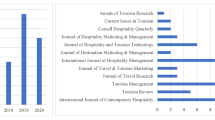Abstract
Marketing through the network is the basic marketing method in the information age. It has certain marketing value, and its position has gradually become stable. It has become the mainstream marketing method, especially praised by the tourism industry, which has injected fresh blood into this field. As the development of tourism market is dynamic, businesses will consider the needs of tourists when paying attention to its development process, so as to design performance evaluation criteria for tourism marketing. Under this research background, by integrating big data analysis technology and deep learning technology, this paper has successfully developed an Internet marketing performance evaluation system for the tourism market. This system can effectively evaluate the actual development of the tourism industry, and the system design comprehensively considers the 360° performance appraisal and balanced integral models. Based on the actual tourism data of a certain place, this study summarizes some additional evaluation indicators, thus improving the evaluation model and laying the foundation for the introduction of data and model construction process of AHP. Applying the principle of maximum membership, the experimental results demonstrate that a scenic spot with poor performance evaluation results has the highest membership. This highlights the practical application value of the Internet marketing performance evaluation system for the tourism market, which effectively analyzes market performance. This paper improves the performance evaluation system by introducing in-depth learning and big data analysis technology into the tourism market performance analysis.





Similar content being viewed by others
Data availability
Data will be made available on request.
References
Baum T, Szivas E (2008) HRD in tourism: A role for government? Tour Manag 29(4):783–794
Cao X, Luo Z, Qiu J, Liu Y (2022) Does ostracism impede Chinese tourist self-disclosure on WeChat? The perspective of social anxiety and self-construal. J Hosp Tour Manag 50:178–187
Fletcher C, Pforr C, Brueckner M (2016) Factors influencing Indigenous engagement in tourism development: an international perspective. J Sustain Tour 24(8–9):1100–1120
Hoi HT (2020) Advertising Vietnam's tourism products in the technology age. In: Proceedings of the 2020 international conference on management of e-Commerce and e-Government, pp 11–15
Huang HY, Wei HX, Wei M (2019) Dynamic performance assessment system for Green tourism supply chain. Tour Anal 24(4):467–482
Kitsios FC, Grigoroudis E (2020) Evaluating service innovation and business performance in tourism: a multicriteria decision analysis approach. Manag Decis 58(11):2429–2453
Lou SY, Ming QZ (2017) On the tourism marketing by WeChat official account of Dehong Dai and **gpo autonomous prefecture for the National Day golden week in 2016 against the backdrop of big data. In 2017 IEEE 2nd international conference on big data analysis (ICBDA), pp 523–526
Peng L, Lai L (2014) A service innovation evaluation framework for tourism e-commerce in China based on BP neural network. Electron Mark 24(1):37–46
Qian X, Xu Y, Mei X, **e X (2021) Tactics for **njiang tourism industrial belt based on performance evaluation. Sustainability 13(22):12473
Sellers-Rubio R, Calderón-Martínez A (2021) Brand strategy scope and advertising spending: The more the better? Tour Econ 27(1):70–85
Tang R, **u P (2021) The modern service industry agglomeration and tourism efficiency in China: regional difference and influencing mechanism. J Asia Pacific Econ 1–20
Tsiotsou RH, Vlachopoulou M (2011) Understanding the effects of market orientation and e-marketing on service performance. Market Intell Plan 29:141–155
Wang LN (2017) Fuzzy quantitative evaluation on tourist scenic spot service quality in the perspective of Wechat marketing. Int J Knowl-Based Intell Eng Syst 21(4):227–233
Wu TP, Wu HC, Liu SB, Hsueh SJ (2018) The relationship between international tourism activities and economic growth: evidence from China’s economy. Tour Plan Dev 15(4):365–381
Funding
The authors have not disclosed any funding.
Author information
Authors and Affiliations
Corresponding author
Ethics declarations
Conflict of interest
The authors declare that they have no known competing financial interest or personal relationships that could have appeared to influence the work reported in this paper.
Ethical approval
This article does not contain any studies with human participants performed by any of the authors.
Additional information
Publisher's Note
Springer Nature remains neutral with regard to jurisdictional claims in published maps and institutional affiliations.
Rights and permissions
Springer Nature or its licensor (e.g. a society or other partner) holds exclusive rights to this article under a publishing agreement with the author(s) or other rightsholder(s); author self-archiving of the accepted manuscript version of this article is solely governed by the terms of such publishing agreement and applicable law.
About this article
Cite this article
Su, X., Yin, W. Application of Internet big data analysis technology based on deep learning in tourism marketing performance evaluation. Soft Comput (2023). https://doi.org/10.1007/s00500-023-08482-5
Accepted:
Published:
DOI: https://doi.org/10.1007/s00500-023-08482-5




